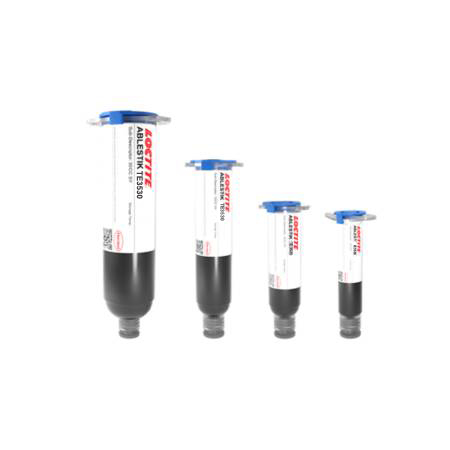LOCTITE ABLESTIK TE3530
Harmonization Code : 3506.91.90.99 | Prepared glues and other prepared adhesives, not elsewhere specified or included; products suitable for use as glues or adhesives, put up for retail sale as glues or adhesives, not exceeding a net weight of 1 kg ; Adhesives based on polymers of headings 3901 to 3913 or on rubber; Other ; Other
Main features
- One component
- Thermally conductive
- Low viscosity
Product Description
LOCTITE ABLESTIK TE 3530 adhesive is designed for bonding heat dissipation components and can be applied by automatic syringe dispense. It cures at moderate to low temperatures allowing it to be used on heat sensitive materials.
LOCTITE ABLESTIK TE 3530 is a white, thermally conductive epoxy adhesive with low temperature cure that is typically used in sensor and die attach assemblies. Operating temperature is 150°C.
Cure Schedule
- 30 minutes @ 100°C or
- 15 minutes @ 120°C or
- 10 minutes @ 150°C
Technical Specifications
| General Properties | |||||
| |||||
| Physical Properties | |||||
| Viscosity Viscosity Viscosity is a measurement of a fluid’s resistance to flow. Viscosity is commonly measured in centiPoise (cP). One cP is defined as the viscosity of water and all other viscosities are derived from this base. MPa is another common unit with a 1:1 conversion to cP. A product like honey would have a much higher viscosity -around 10,000 cPs- compared to water. As a result, honey would flow much slower out of a tipped glass than water would. The viscosity of a material can be decreased with an increase in temperature in order to better suit an application | 60,000 mPa.s | ||||
| Thermal Properties | |||||
| |||||
| Thermal Conductivity Thermal Conductivity Thermal conductivity describes the ability of a material to conduct heat. It is required by power packages in order to dissipate heat and maintain stable electrical performance. Thermal conductivity units are [W/(m K)] in the SI system and [Btu/(hr ft °F)] in the Imperial system. | 2.3 W/m.K | ||||



